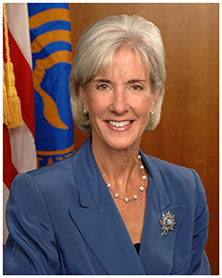With just three weeks to go in open enrollment, U.S. Health and Human Services Secretary Kathleen Sebelius came to Atlanta on Monday with a simple message about the health insurance exchange: “It’s not too late to enroll.’’
Her visit was part of a broad White House effort to encourage enrollment in the health exchanges prior to the March 31 deadline. Americans generally must have signed up by then or face a financial penalty under the 2010 Affordable Care Act, also known as Obamacare.
Sebelius also made a pitch for Georgia and other states to expand their Medicaid programs. Under the ACA, the federal government is picking up 100 percent of the costs of expansion for the first three years for states that opt to expand coverage. Georgia is one of many states that have decided not to do so.
“Georgia is losing $9.2 million a day in federal funding’’ by not expanding the program, Sebelius said. The uninsured “are still coming through the doors of the emergency room,’’ she said. “In the meantime, taxpayers are picking up that cost.’’
But expansion in Georgia appears to be a political long shot, at least for now. Gov. Nathan Deal says expansion would ultimately cost the state too much.
The White House this month has stepped up its campaign to encourage sign-ups in the exchanges.
The ACA was passed four years ago, and has been the subject of extensive news coverage, both favorable and unfavorable. But polls indicate that many people still know little about it. Even as the law’s provisions affect more and more people, some Americans believe it is no longer on the books.
On a more specific issue, a significant number of people don’t realize they’re eligible for subsidies to afford coverage on the exchanges, and some don’t know about the exchanges at all.
President Obama last week appealed directly to Latinos via a live-streamed town hall broadcast on Spanish-language television networks. And he, first lady Michelle Obama and top administration officials all have events this week that aim to reach America’s mothers, who typically drive health care decisions for their families, Politico reported.
Sebelius, in talking to the media Monday at the Center for Black Women’s Wellness in Atlanta, made a pitch for African-Americans to enroll.
She pointed out that African-Americans are more than 55 percent more likely to be uninsured than whites, and that black women are twice as likely to suffer from heart disease, and are 40 percent more likely to die from breast cancer.
More than 100,000 Georgians have already enrolled in the exchange, as of the end of January.
Also addressing the media was John Eaves, the Fulton County Commission chairman, who pointed out that roughly 20 percent of Georgians are uninsured, and that many of those suffer from chronic diseases such as asthma, diabetes, heart disease and HIV.
“It’s not rocket science; we need our citizens insured,” he said.
New enrollees include Erin Anderson of Atlanta, a business owner who has been without health coverage. She said she recently signed up for health and dental plans that will cost her $125 a month.
The White House’s Medicaid expansion push – which could bring coverage to hundreds of thousands of Georgians – has made no headway with the governor or other top political leaders. Now, some legislators want to put up another obstacle to it. A bill has been introduced that would require approval from the Georgia General Assembly before any expansion could occur.
The bill’s lead sponsor, Rep. Jan Jones (R-Milton), argued that expansion’s cost, on top of the current $3 billion state appropriation for Medicaid, would force tough decisions on spending elsewhere. “What do you want to cut?” she asked recently . “What tax do you want to increase?”
Another bill would prohibit employees of any state unit from spending state funds to advocate for Medicaid expansion. It would also target the exchange effort, barring the University of Georgia from operating its current “navigator” program, which trains and dispatches people to assist Georgians trying to get coverage under the ACA.
When asked about these state bills, Sebelius said expansion would help safety-net hospitals such as Grady Memorial in Atlanta defray the costs of serving low-income people.
Georgia Democratic Congressman Hank Johnson also attended the event. He represents a district in metro Atlanta, but made the point that some rural hospitals in Georgia have closed recently. Those closings were partly blamed on the numbers of uninsured people the hospitals had to treat.
Sebelius said of the UGA navigator program: “I can’t imagine a more important job than letting people know what the law says, and what their rights and benefits are.’’

